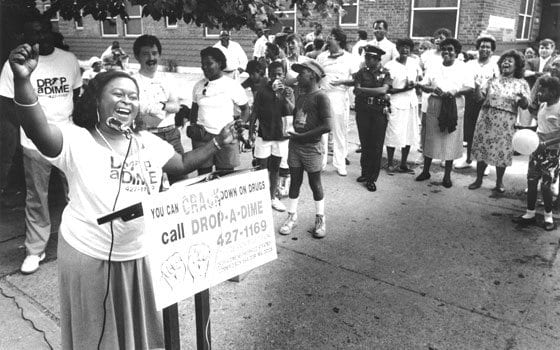
| Watson’s fierce brand of advocacy and organizing earned her wide-ranging respect from legislators, community members and law enforcement officials alike. (Banner file photo) |
Georgette Watson, a community activist that co-founded the successful “Drop-a-Dime” hotline, died on Aug. 29 in Baltimore.
Born in Philadelphia, Watson and the Rev. Bruce Wall, pastor of Global Ministries Christian Church in Codman Square, started the hotline in 1983. They launched the citizen-based organization in her Dorchester home, beginning with a single telephone and answering machine. The founders asked community members to call the hotline and give detailed information about illegal activity. From there, reports were collected and passed on to the police.
Thanks to the anonymity afforded callers and its promise of confidentiality, Drop-a-Dime became an integral link between a community afraid of reporting crimes for fear of retaliation and a Boston police force eager for more community cooperation.
Joseph Carter, then-Boston Police Department superintendent and chief of the BPD’s special operations bureau, said at the time that Drop-a-Dime was “one of the most worthwhile and positive relationships that I’ve had with a community grassroots organization involved with abating crime activity.”
Soon, public and private organizations across the country began to take notice of Drop-a-Dime’s early success, and looked to it as a model to pattern similar programs in their communities.
Watson’s activism and leadership earned accolades from political leaders, including her selection by President George H.W. Bush as a recipient of a Thousand Points of Light award, and wide-ranging respect from legislators like former mayor and U.S. ambassador Raymond L. Flynn.
“Georgette Watson was nationally recognized for the tremendous street credibility she had built up over the many years working closely with the Boston police and community activists,” Flynn said in a statement. “The Drop-a-Dime program, under the strong and courageous leadership of Georgette Watson, along with a strong partnership with the clergy, provided law enforcement officials with critical community information.”
Watson’s work also put her in harm’s way.
In January 1990, the Associated Press reported that Watson had been under “24-hour police protection” because a gang had allegedly placed a $5,000 bounty on her the previous month. But her determination did not waver, as the AP further reported Watson’s role in convincing a Boston merchant to stop selling baseball caps emblazoned with the names and insignia of two local street gangs.
Gov. William F. Weld appointed Watson to lead the Governor’s Alliance Against Drugs in 1991. After five years, Watson’s stint as drug czar came to an end, marred by accusations of mismanagement, controversy surrounding a taxpayer-financed trip to the Caribbean, a letter of resignation rescinded days after it was sent, and assorted other problems.
After leaving the Weld administration, Watson moved to Maryland. She remained active, campaigning for people with disabilities even as she suffered from debilitating kidney and other health problems.
Watson, a single mother, raised three children in Dorchester. She attended the University of Massachusetts-Boston, graduating with a bachelor’s degree in legal education and a paralegal certificate before earning a master’s degree in education from Antioch University in Cambridge. She also received an honorary doctorate from Emmanuel College.
Watson is survived by her husband, James O’Connor; a son, Isaac Trappiel III; a daughter, Tonja Trappiel; her mother, Louise Dulin Johnson of Boston; three sisters: Barbara Powell, Terry Dulin and Francie Dulin; three brothers: Ernest Dulin, Andrew Dulin and Corey Dulin; six grandchildren; two great-grandchildren; and a host of other relatives and friends. One daughter, Rochelle Trappiel, died from breast cancer several years ago.
A small ceremony was held in Maryland, and a memorial service was held Monday morning at Rev. Wall’s Global Ministries Christian Church, located at 670 Washington Street in Dorchester. Watson’s remains were cremated.







